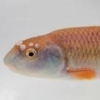Your bass will become a pain in the "big toe"  in a short period of time.
in a short period of time.
If it were me, I'd really consider something besides a bass and creek chub tank. You have a TON of awesome fish that live near and around you (esp among the Cyprininds/minnows), you just need a little time to find your way to them.
Have you run across this publication?
http://www.dfo-mpo.g...-on/index_e.htmThis would be a helpful thing to have with you streamside and will keep your choices to a minimum so you don't have to bother yourself with all the stuff we have down here.
Your higher diversity streams will be those draining into Lake Erie and St. Clair, such as the Grand and Syndenham. But around Simcoe and north, you really get into the northern distributed Cyprinids that are sooo cool, such as the pearl, northern red belly, and finescale daces. In any of the groundwater driven streams, you should find longnose and blacknose dace in the faster riffles. And you've got blackchin and blacknose shiners, iowa darter abundantly in any lake, and probably hordes of rosyface and common shiner in the more productive portions of the watersheds.
Todd










